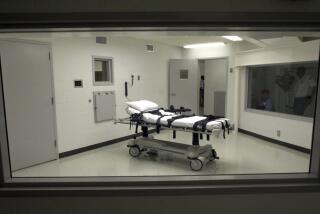For Terre Haute, a Month’s Reprieve
- Share via
TERRE HAUTE, Ind. — The execution of Timothy J. McVeigh planned for Wednesday was to have been the most complicated, most secure and perhaps most scrutinized in American history, and thousands of federal, state and local officials had been planning for it since Aug. 14, 1997, the day he was sentenced.
They now have less than one month to plan it again.
“Oh, don’t tell me we’re going to have to do this all over,” one federal Bureau of Prisons official groaned Friday as word spread here that Atty. Gen. John Ashcroft was about to postpone the execution until June 11.
The lead-up to what was to have been the first federal execution in 38 years was so emotionally trying, so logistically complex that even McVeigh expressed some concern over how the stay might affect those planning his death, as well as the residents of this town, according to one of his defense attorneys, Rob Nigh.
But even before Ashcroft made the announcement shortly after 1 p.m. EST, Bureau of Prisons officials were hunkered down with Warden Harley Lappin to start over.
First, however, they had to decide how to halt the massive and still-building spectacle outside the federal penitentiary, and throughout this city of 57,000, which is 70 miles west of Indianapolis.
On Friday, dozens of trailers for television crews were spread across 25 acres of the low-cut lawn that surrounds the red brick prison, generators humming to provide power, miles and miles of cable to beam back images of network anchors and their guests. Tents for both pro- and anti-death penalty demonstrators had been erected. Cases of bottled water and soda, truckloads of cameras and battery packs, desks, phone lines and portable toilets had been brought in.
Late in the day, the Bureau of Prisons decided to tear it all down by Monday and rebuild it next month.
At the same time, hoteliers, shopkeepers and T-shirt vendors stuck with shirts silk-screened with the execution date of May 16 were deciding how to proceed.
Hundreds of journalists, camera crews, and technicians from around the world began packing up as soon as Ashcroft announced the stay. Even more reporters were due to arrive over the weekend, bringing the total for media members alone to about 1,600, and local leaders grimaced at the likely economic effect of the delay.
While residents have sought to distance their city from the divisive debate over the death penalty, saying they didn’t ask that McVeigh be executed here, they have also been preparing, with caterers, pizza places, cell phone vendors all stocking up to serve the masses.
On Friday, the Terre Haute Chamber of Commerce estimated losses would be in the hundreds of thousands of dollars.
“We’ve been telling people for five months, ‘Sorry, we’re booked,’ ” said Joyce Burdine, director of sales at the Holiday Inn, where the Bureau of Prisons had set up its command post. “I’ve been sending people to hotels as far away as Indianapolis. This is going to be costly for everybody.”
By late afternoon, even the “Federal Bureau of Prisons” sign was gone from a conference room at the hotel, and the door was locked.
Law enforcement agencies from the Indiana State Police to the FBI had been sending in reinforcements for Terre Haute’s 124 officers, and they, too, began deciding how to pull out and how to redeploy in a month--presuming there isn’t then another delay.
By the time of the stay Friday, the official timeline for McVeigh’s execution had reached well into the 54-page “Execution Protocol,” prepared by the Bureau of Prisons beginning eight years ago, when rules for resuming federal executions were set in place.
According to the protocol, in a period of 29 to 14 days before the execution, Lappin would have completed arrangements with a physician to be present to declare McVeigh dead. By Thursday, he would have purchased the three drugs used to kill McVeigh--sodium Pentothal to put him to sleep; Pavulon to relax his diaphragm and lungs, causing his breathing to stop; and potassium chloride to stop his heart.
Between Friday and Sunday, Lappin would have held one last meeting with the executioners and their alternates, going over final details and officially promising that their names would not be divulged.
And by Monday, McVeigh would have been moved by van to a holding cell adjacent to the execution chamber. Instead, he will stay where he is and, for the next month at least, likely follow the story of his stayed execution on a black and white television.
More to Read
Sign up for Essential California
The most important California stories and recommendations in your inbox every morning.
You may occasionally receive promotional content from the Los Angeles Times.













